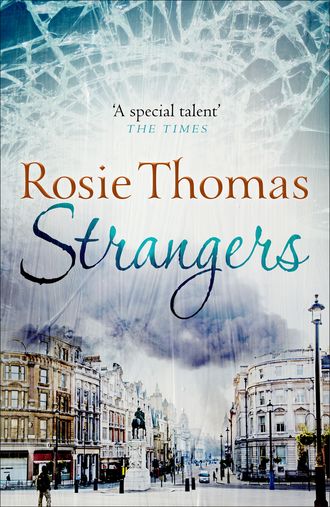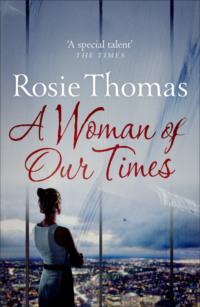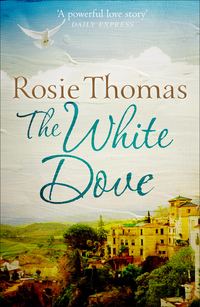
Полная версия
Strangers
He smiled at her. ‘I knew objectively that it could probably happen in real life. But I’ve never known it like that before, either. We do belong together, Annie, my love. Listen to me. I love you.’
She felt real pain then, and she crouched in his arms trying to contain it. ‘Matthew, I …’
But he put his hand up to cover her mouth. ‘Be quiet,’ he ordered her.
Martin knew, of course. He turned to her one day, tidily putting his paintbrush down on the tin lid so that it wouldn’t drip gloss paint on to their kitchen floor.
‘Who is he, Annie?’
He was trying to sound casual. Annie knew him so well that she understood exactly why. He would try to make light of the threat for as long as he could. But that didn’t mean that it wasn’t hurting him.
‘You don’t know him. I met him a month ago, at Louise’s.’
They were standing shoulder to shoulder now, looking out into the well of the block of flats with its smudges of pigeon droppings. She couldn’t see his face but she knew he would be frowning, the vertical lines deepening between his eyebrows.
Carefully, he said, ‘Do I need to worry about it?’
There was a long silence. Decide, Annie commanded herself. You must decide.
At last, recognizing her own cowardice and with the sense of a light fading somewhere as she had been afraid it would, she whispered, ‘No.’
Martin’s hand covered hers. There were paint splashes on his fingers. She could feel the set of his shoulders easing with relief.
‘I won’t worry, then.’ He squeezed her hand and let it go, and then picked up his brush to start work again.
‘What is it?’ he asked after a moment. ‘Pre-marital itch?’
‘I suppose so,’ she said dully. She despised herself for reducing Matthew to that, even for Martin’s sake.
The time trickled by. It was the hottest summer for years, and every day that passed seemed burnt into her memory by the blistering heat of the pavements and the hard blue light of the sky. Matthew finished his carpentry work at the shop and he moved out of the grubby little room. He was staying with another friend now, unrolling his sleeping bag on yet another sofa. Annie wouldn’t let him come to her flat because Martin had a key to it too. They met when and where they could, and she was amazed by his ability to make her forget everything else that was happening. He made her feel irresponsibly happy. When she was with him, she knew that this was reality, and the other half of her life, the half that was occupied with shopping for clothes for her honeymoon and choosing flowers for her bouquet, was the dreamworld.
Then, only a week before the wedding, Matthew asked her again.
They were at yet another friend’s home, but the house was empty for the weekend this time and so Matthew automatically made it his own. They were in bed, and Annie was lying with her hair spread out over the pillow. She was thinking exhaustedly, This must be the last time.
‘Annie, will you marry me?’
Traffic noises from the street outside, and evening birds twittering in the trees in the square. She had a taste of her future with Martin as she lay there. There would be evenings like this in a house that was really theirs. Peace, and comfort, cooking smells and simple domestic rhythms, and Martin who she knew, and understood, and loved. She closed her eyes so as not to see Matthew’s face, because what she felt for him went deeper than love.
‘I can’t jilt him,’ she whispered. ‘I can’t marry you.’
‘Those are two quite distinct and separate incapabilities,’ he told her gently. ‘Which is the real one?’
What would it be like to be married to Matthew?
There would be a succession of rented rooms, and Matthew would manage to make her feel that they were palaces. There would be the wild swings from penury to extravagance and back again, and no two days would ever follow each other in the same way. She was sure that they would be happy. Ever since she had known him he had made happiness blaze like fire inside her. What she didn’t know was how long that could last.
She was afraid that a day would come when the discomforts would begin to matter, and pleasure would fade into resentment. The shortcomings were her own. She was cautious and predictable and careful, and Matthew was none of those things. She longed to be like him, to cut herself loose and sail with him, but she couldn’t do it. She would live her life with Martin and it would be tranquil, and sunny, and safe. The peaks of joy would be out of her reach, but she didn’t think that there were troughs of despair waiting for her either.
She made herself meet Matthew’s steady grey stare.
‘I’m a coward,’ she said. ‘I can’t marry you.’
He bent his head. Their fingers were locked together and the knuckles of both hands were white. Then he looked up again.
‘I know why you think you can’t. You believe that married men have mortgages and salaries to meet them, and prospects and some kind of security to offer you. You’re afraid that after a while you’ll begin to resent me because I haven’t. That’s true, isn’t it?’
She nodded miserably. There was more than that, but that was the stupid, pedestrian nub of it.
‘Well. I went to see my father today. I asked him for a job in the company. There was a long lecture about having to start at the bottom like everyone else. Learn the business. Not expect any quarter just because I’m the boss’s son. Work hard and prove my worth.’ Matthew’s face was a picture of resigned boredom. It made her laugh in the midst of everything, and he beamed back at her. ‘I nearly threw one of his onyx inlaid executive toys at him, but I restrained myself for your sake. After the lecture he told me that he was glad I’d decided to pull myself up by my boot-straps … boot-straps, I promise you … and I could certainly have some simple tasks allotted to me within the corporate structure. So there, now.’ His smile was dazzling. ‘I’ll be so exactly like everyone else that only experts like you will be able to tell the difference. I’ll be able to buy you a diamond ring, and a three-piece suite and a Kenwood Chef, if that’s what you really want.’
He was trying to make her laugh because he didn’t want her to guess the magnitude of what he was really offering. He was holding out everything he valued, his freedom and his independence, for her to take and dispose of. Annie felt the tears like needles behind her eyes.
‘I don’t want you to do anything for my sake. I don’t want to see you go off every morning in a suit. Thank you for offering to do it, but I’m not worth it.’
She hadn’t meant to let him see her crying, but the tears came anyway. Matthew made a little, bitter noise.
‘I can’t win, can I? You won’t marry me when I have no prospects. You won’t marry me when I do, because Matthew with prospects isn’t Matthew.’
A space had opened between them, mocking their physical closeness, and Annie knew that they would never bridge it again.
‘I’m sorry,’ she said hopelessly. She felt smaller, and more selfish and more ashamed, than she had ever done in her life.
‘Tell me one thing,’ he said. ‘Tell me that it isn’t just because you haven’t the guts to cancel your wedding and send back the horrible presents and shock all your mother’s friends.’
Annie lifted her chin to look straight at him. ‘If I was courageous enough to marry you, I would be courageous enough to do all that.’
Matthew let go of her hand. He slid away from her across the bed and lay looking through the window into the trees in the square.
‘All the time,’ he said softly, almost to himself, ‘all the time until tonight I was sure that I could win.’
There was nothing else to say. Heavy with the knowledge that she had disappointed him Annie slid out of bed and put her clothes on. When she was dressed she went to the bedroom door and stood for a moment looking at him, but Matthew never turned his gaze from the trees outside the window. She closed the bedroom door and went downstairs, and out into the square where the day’s heat still hung lifelessly over the paving stones.
She never saw Matthew again.
She went home to her flat, and found Martin sitting at the kitchen table waiting for her.
‘I’m back,’ she said simply. Her face still felt stiff with dried tears.
Martin stood up and came across the room to her, then put his arms around her and held her against him.
‘I’m glad, Annie.’
They were married a week later on a brilliantly bright July day. Their approving families were there, and the dozens of friends they had accumulated over the years of knowing one another, and they had walked out under the rainbow hail of confetti to smile at the photographer who was waiting to capture their memories for them. The photograph stood in a silver frame on the bow-fronted mahogany chest in their bedroom. Eleven years later, when she picked the photograph up to dust it and glanced down into her own face, Annie had forgotten how painful that smile had been.
‘I had forgotten,’ she said. ‘But it’s so vivid now. I can see his face so clearly.’
The boat was rocking gently on the dark water, and in that movement Steve’s hand had become Matthew’s, holding hers, pulling her back. His voice was different but she knew his face, and the way he moved, and she could remember every hour that they had spent together as if she was reliving them.
For an instant she was suffused with happiness. It isn’t too late, she thought. Why was I so sure that it was?
She smiled, and then felt the stinging pain at the corner of her mouth where the blood had dried.
Not Matthew’s hand. This man was Steve, a stranger, and now more important to her than anyone. She felt another pain, not physical now but as quick and sharp as a razor slash. It was the pain of longing and regret.
‘I wish I could reach you,’ she said. ‘I wish we could hold on to each other.’
Tears began to run out of the corners of her eyes and she felt them running backwards into her knotted hair.
‘We are holding each other,’ Steve said. ‘Here.’
The pressure of his hand came again, but Annie ached to turn and find the warmth of him, pressing her face against his human shelter. She was afraid that the weeping would take possession of her. It pulled at her face with its fingers, distorting her mouth into a gaping square and the blood began to run again from the corner of it.
‘It’s too late,’ she cried out, ‘too late for everything.’
This was the end, here in their tomb of wreckage. The tidy plait of her life stretched behind her, the stridently glittering threads of the past softened by time into muted harmonies of colour. Martin and she had woven it together. She thought of her husband and of Thomas and Benjamin left to look at the brutally severed plait, the raw ends uselessly fraying. Sobs pulled at her shoulders, and her hair tore at her scalp.
‘Don’t cry,’ Steve said. ‘Please, Annie, darling, don’t cry. It isn’t too late.’ If they only could hold each other, he thought, they could draw the shared warmth around them like armour. He tried to move again, and knew that he couldn’t pull his crushed leg with him.
‘My mother’s ill,’ Annie said abruptly. ‘She’s got cancer, they’ve just told her. It must be just the same.’
Steve could follow her thoughts, unconfined, flickering to and fro. The extra dimension of understanding was eerie but he took it gratefully. ‘No,’ he contradicted her. ‘Not the same sense of loss. No waste. Your mother has seen you grow up, marry. Seen her grandchildren. Illness isn’t the same as … violence.’
He wouldn’t say violent death, but he sensed Annie’s telepathic hearing as clear as his own.
‘Perhaps … perhaps everyone’s death is violent, when it comes.’
They were silent then, but they were unified by fear and they could hear one another’s thoughts, whispered in childlike voices quite unlike their own.
‘If they come for us in time,’ Annie said, ‘and there is any life left for us that isn’t just lying here, I won’t let any more of the days go. I’ll count each one. I’ll make it live. I’ve shrugged so many days off without a single memory. Dull days. Resigned days. Just one of them would be so precious now. Do you understand, Steve?’
‘Oh yes,’ he answered. ‘I understand. Annie, when we’re free we can do whatever we like.’
Steve tried to think about how it would be, and nothing would come except confused images of Vicky, and of unimportant restaurants where he had sat over lunches, and of preview theatres where he waited in the dark for clients to watch their fifteen-or thirty-second loop of commercial over and over again. ‘Run it through a couple more times, David, will you?’ His own voice. ‘Did you learn all that at LMH?’ The self he had been. Work and play, alternating, undifferentiated, spooling backwards. And now the tape snapped, and the film he had only been half-watching might never start up again.
Steve opened his eyes on the real darkness. He seemed to have been groping backwards for hours, failing to find an image that he could hold on to amongst so many that flickered and vanished.
‘Annie?’ he called out, seized with sudden panic. ‘Are you still there?’
‘Yes.’
She sounded drowsy, too far away from him.
‘Annie?’
He could hear the effort, but she responded at last. ‘Yes. I’m still here.’
‘Talk to me again. About your mother. Anything, just go on talking.’
‘I …’ she sighed, a faint expiry of breath and he knew that he was only imagining the brush of it on his cheek. ‘I can’t talk any more. You talk, Steve. I like to hear your voice.’
When was the last time? That was what he wanted to catch hold of before it was too late, the last time he had felt the rawness of wanting something very much. The last time he had wanted something in the way that he wanted to live now, because he wouldn’t be defeated by a maniac’s bomb. Was that the key to it? Because he wouldn’t be defeated …
Steve felt his head thickening, the thoughts and memories beginning to short-circuit. He forced his eyes open wide, willing himself to hold on to consciousness, and he began to talk.
‘A long time ago. So long I’d forgotten how important it was. I wanted to get away, that was it. My Nan’s flat, Bow High Street, three floors up. From the moment I went to live there, I wanted to get away.’
It had taken long enough, but he’d made it in the end. When the day came he went into the little room that led off Nan’s kitchen and stuffed jerseys and shirts into his blue duffel bag. Nan was sitting in the kitchen watching the television. He could see her bulk past the half-open door, and the tablecloth half-folded back over the Formica-topped table, and the brown teapot and milk bottle, and her cup and saucer waiting to be refilled with thick brown tea.
‘Off again, are you?’ she shouted over the din of the television.
There had been trial getaways before this. Plenty of Saturday-night stopovers in overcrowded flats when those who were left behind after the part petered out had just fallen asleep wherever they fell down. There had even been a week, not long ago, when he had stayed with a girl up near Victoria Park. That had been too good to last, of course. She’d seen through his assumed adult suavity all too quickly.
‘Sixteen? Is that how bloody old you are? Sixteen? Go on, get back to your mother before they come and lock me up for corrupting infants.’
Nan had welcomed him back, and the sharpness of her tongue didn’t disguise her relief. ‘Where the hell d’you think you’ve been? Not a word from you for a week. Didn’t you know I’d be worried stiff? You’ll end up like your Dad, Stevie, after all I’ve done.’
He put his arms around her. She was fat, but she was also frail and she could only move stiffly across the poky kitchen.
‘I will not end up like my Dad. You know that.’
Nan had shifted her dental plate with the tip of her tongue and said acidly, ‘Perhaps not. But there’s plenty of other ways of going to the bad. I daresay you’ll manage to find one that suits you.’
There had been calm after that for several months.
Now, as he closed the empty drawers in his bedroom one by one, he tried calling out, ‘Nan? Nan, I’m going to live up West …’
She couldn’t hear him, of course. The television obliterated everything. So he had finished his methodical packing, even taking down his childhood posters of West Ham United and Buddy Holly and folding them up. Then he went into the kitchen and put his assortment of bags down on the cracked lino floor. He crossed to the vast television set and turned the volume knob, and silence descended.
‘Eh? I was watching that, Stevie. Don’t play about, there’s a good boy.’
‘Nan, I want to talk to you. I’m going to live up West. I’ve got a room and everything. I’ll be all right.’
He had been so callous in those days. Nan had just sat and stared at him, with her big pale fingers twisting in her lap.
‘Eh? Live up there? What for? You live here, love. Ever since you were that high.’
She held her palm out, a couple of feet off the lino, and Steve thought, Yes, I do remember. And ever since I’ve wanted to get out. ‘I can’t live here for ever, Nan. I want to get on. I’ll come and see you weekends, I promise.’
Her face went sullen then. ‘After all I’ve done,’ she murmured.
She had done everything, of course. Mothered him and fended for him, and bought his food and clothes for ten years. He couldn’t pay her back for her devotion, he knew that with chilly sixteen-year-old detachment.
‘I’ll come and see you often,’ he repeated. ‘And as soon as I’ve made it I’ll buy you a better place, up near me or here, whichever you like.’
‘Make it?’ she snapped at him. ‘How are you going to do that? What about school? You could go to college. Mr Grover told me himself.’
Patiently he had tried to explain it to her. ‘I don’t need to go to college. It’s a waste of time, all that. I’ve got a job, Nan. I’m not going back to school.’
She was too angry to listen to him. So he had hugged her unyielding bulk, picked up his belongings, and marched out.
All he felt was relief as he left the Peabody Buildings. He bumped past each pair of heavily-curled brown-painted balcony railings, down the tight spiral of stone steps to the road. He walked briskly up the street to the bus stop and then stood peering eastwards into the traffic for the first sight of the bus that would take him up West for good.
The job was as a messenger for an advertising agency, and his home was a second-floor bedsitter with a restricted view straight down into the Earl’s Court Road. As soon as he arrived, Steve knew that he would never look back. After eighteen months as the Thompson, Wright, Rivington messenger boy he was offered the humblest of jobs in the media buying department. That job led to another and then another, and then to the huge leap upstairs to the circus of the creative floor. From Thompson, Wright, Rivington he was headhunted by another agency, and he began to enjoy money for the first time in his life.
Then, Steve remembered, I wanted everything. I was so busy making sure I got it that I never thought about anything else.
There were plenty of other people like him, and the time was ripe for all of them. His agency career began with the first shy appearances of pink shirts at client meetings, and it blossomed all through the sixties and into the seventies between lunches at the Terrazza and afternoons at the Colony Club, punctuated by parties swaying with girls in miniskirts and location shoots in exotic places and creative crises when somebody, usually Steve himself, managed to come up with a headline in the nick of time. Perhaps it hadn’t really been like that at all. It felt too far back to remember. But it had seemed easy and so congenial that for a long, long time he had gobbled up everything that came his way.
Some time during those years, Nan had died. Steve had been in Cannes at the time of the funeral, doing business, and he couldn’t fly back home for it. But he had paid for everything to be done properly. And he had sent a wreath, which was more than Nan’s only daughter, Steve’s mother, had bothered to do. If she even knew that her mother was dead. Steve himself had hardly seen her since she had taken him, at the age of six, to live with his grandmother.
‘Poor Nan,’ he said softly. And then, is remembering always feeling ashamed?
No, it wasn’t so for Annie. Annie had fulfilled all kinds of promises that he had broken himself. Steve felt the slash of regret and telepathically she whispered, ‘It isn’t too late.’
His reaction to the pain was anger instead of fear now. He heard himself shouting, ‘Where are they then? Why don’t they come for us, before it is too late?’
The mass hanging over them swallowed the sound and gave nothing back. They couldn’t hear anything at all.
‘Oh, Jesus,’ Steve said.
‘It’s all right.’ Annie soothed him as if he were Benjy. ‘You believe that they’ll reach us in time. You made me believe, too. They’ll come. We must just hold on … What are you doing?’
Steve was disentangling his hand from hers.
‘I want to find out how long it’s been.’ His fingers felt swollen and hooked with cramp as he fumbled painfully for the watch.
‘We must hold on,’ Annie repeated, as if she was obediently reciting a rote lesson, ‘until they come for us.’
Steve realized how much of her strength she was drawing from his reassurance, and wondered how long that could last. He felt much weaker now, and the pain from his leg clawed across his hip and stomach. He drew the watch out and laid it face upwards on his chest. Again he traced over the tiny hands with his fingertip. Suddenly dizziness enveloped him as he struggled to make sense of what he could feel. The hands were almost vertical, opposite to one another, and he touched the winder button to make sure.
Six o’clock … it could be six o’clock. If it was six o’clock it would be dark outside too. How could they search in the dark? Lights. Of course, they would bring emergency generators. They wouldn’t stop looking until they had found the two of them. Steve struggled to draw sense out of the tiny, baffling circle and suddenly realized with a wave of relief, not six o’clock … It was half past twelve. Saturday lunchtime. Out there people would be cooking meals, telephoning one another, driving past twinkling shop windows on the way to warmth, doors closing against the wind, the sound of voices. The dizziness disorientated him, and he was shivering.
‘Annie …’ He moved involuntarily, too quickly, and the watch dropped out of his grasp. He heard it rattling and then clinking to rest somewhere beneath him. It was gone.
‘I’m here,’ she said. ‘Go on talking.’
‘I’m very thirsty,’ Steve answered. He was sleepy too, but he wouldn’t let that take hold of him. He began to talk again. His voice sounded slurred and he breathed deeper to control it.
What had happened? Some time during those agency years, without Steve ever having time to recognize it, he had stopped wanting anything. He had stopped feeling hungry. He almost laughed at the obviousness of it now. But the pleasure of being in the thick of such a business, where huge sums of money were treated so anarchically and still successfully, had faded too. It wasn’t just his own appetite that had gone.
By the mid-seventies most of the parties were long over. Budgets were being cut back and unprofitable companies were toppling everywhere. The lunch-tables were ordered by a new breed of accountants, and to describe something as ‘Mickey Mouse’ was no longer a kind of inverted, admiring compliment. Steve’s job was never threatened, he was too good at it for that, but most of what he had liked about it was gone. Holding-company decisions and corporate images and long-term business projections bored him. He liked making commercials, and his freedom to do so was increasingly restricted.









